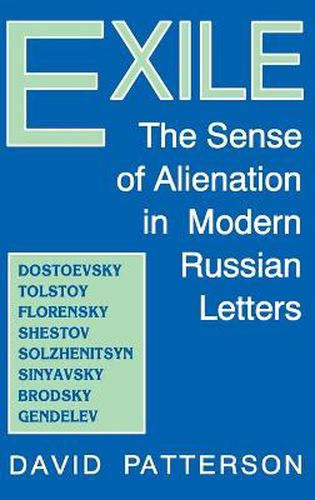Readings Newsletter
Become a Readings Member to make your shopping experience even easier.
Sign in or sign up for free!
You’re not far away from qualifying for FREE standard shipping within Australia
You’ve qualified for FREE standard shipping within Australia
The cart is loading…






The life of a human community rests on common experience. Yet in modem life there is an experience common to all that threatens the very basis of community – the experience of exile. No one in the modem world has been spared the encounter with homelessness. Refugees and fugitives, the disillusioned and disenfranchised grow in number every day. Why does it happen? What does it mean? And how are we implicated? David Patterson responds to these and related questions by examining exile, a primary motif in Russian thought over the last century and a half. By exile he means not only a form of punishment but an existential condition. Drawing on texts by such familiar figures as Dostoevsky, Tolstoy, Solzhenitsyn, and Brodsky, as well as less thoroughly examined figures, including Florensky, Shestov, Tertz, and Gendelev, Patterson moves beyond the political and geographical fact of exile to explore its spiritual, metaphysical, and linguistic aspects. Thus he pursues the connections between exile and identity, identity and meaning, meaning and language. Patterson shows that the problem of meaning in human life is a problem of homelessness, that the effort to return from exile is an effort to return meaning to the word, and that the exile of the word is an exile of the human being. By making heard voices from the Russian wilderness, Patterson makes visible the wilderness of the world.
$9.00 standard shipping within Australia
FREE standard shipping within Australia for orders over $100.00
Express & International shipping calculated at checkout
The life of a human community rests on common experience. Yet in modem life there is an experience common to all that threatens the very basis of community – the experience of exile. No one in the modem world has been spared the encounter with homelessness. Refugees and fugitives, the disillusioned and disenfranchised grow in number every day. Why does it happen? What does it mean? And how are we implicated? David Patterson responds to these and related questions by examining exile, a primary motif in Russian thought over the last century and a half. By exile he means not only a form of punishment but an existential condition. Drawing on texts by such familiar figures as Dostoevsky, Tolstoy, Solzhenitsyn, and Brodsky, as well as less thoroughly examined figures, including Florensky, Shestov, Tertz, and Gendelev, Patterson moves beyond the political and geographical fact of exile to explore its spiritual, metaphysical, and linguistic aspects. Thus he pursues the connections between exile and identity, identity and meaning, meaning and language. Patterson shows that the problem of meaning in human life is a problem of homelessness, that the effort to return from exile is an effort to return meaning to the word, and that the exile of the word is an exile of the human being. By making heard voices from the Russian wilderness, Patterson makes visible the wilderness of the world.